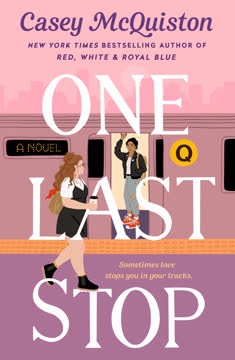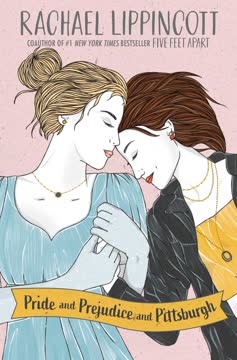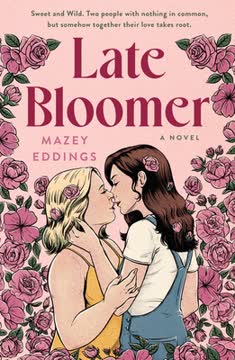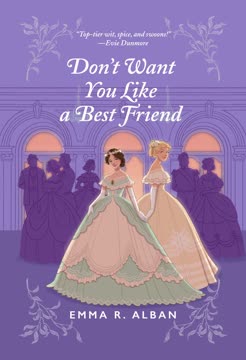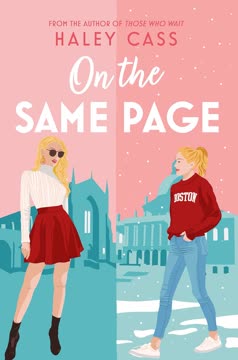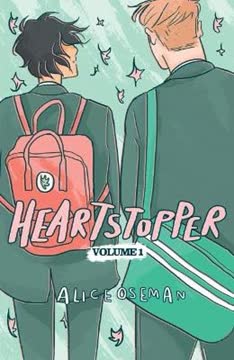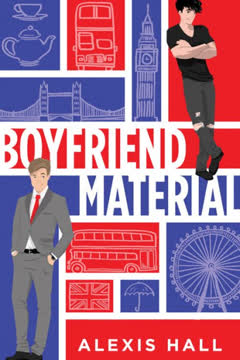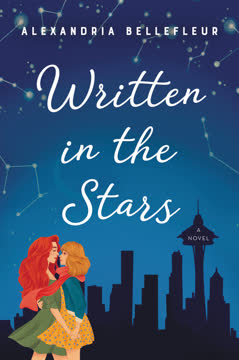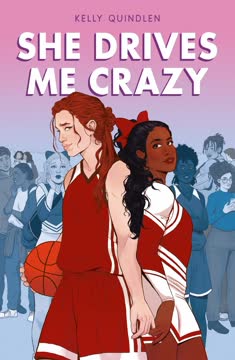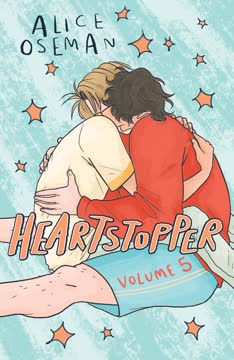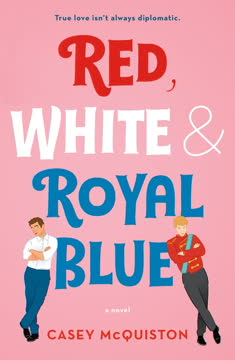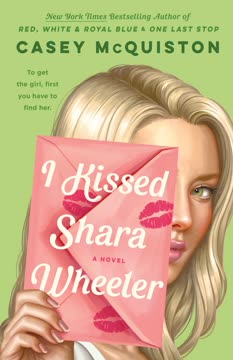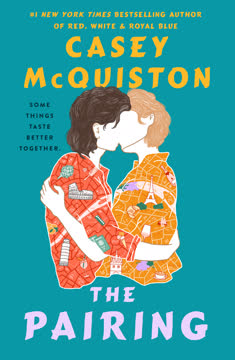Plot Summary
Arrival in Brooklyn
August Landry, a guarded, pragmatic twenty-three-year-old, arrives in Brooklyn, New York, with little more than a suitcase and a head full of skepticism. She's spent her life moving from place to place, never quite fitting in, always helping her mother chase the cold trail of a missing uncle. Now, she's determined to start over, enrolling at Brooklyn College and answering a quirky Craigslist ad for a queer-friendly apartment above a Popeyes. Her new roommates—Niko, a tattooed psychic bartender, Myla, an exuberant artist, and Wes, a reclusive tattooist—welcome her into their chaotic, loving home. August is wary but hopeful, craving stability and a sense of belonging she's never known.
The Pancake Connection
Desperate for a job, August lands a gig at Pancake Billy's House of Pancakes, a beloved, slightly magical Brooklyn diner. The staff—gruff Lucie, gentle Winfield, and legendary cook Jerry—become her new circle. The diner, with its mismatched furniture and walls covered in photos, quickly becomes August's anchor in the city. It's a place where regulars are family, and the scent of pancakes lingers on her clothes. Here, August begins to feel the first stirrings of home, even as she keeps her heart guarded and her past at arm's length.
Subway Encounters
On her first day of classes, August's life changes when she meets Jane, a striking, leather-jacketed girl on the Q train. Jane is magnetic, quick-witted, and seems to exist only on the subway. Their connection is instant, electric—literally, as a spark jumps between them when Jane lends August her red scarf. Jane's kindness and charm linger with August, who finds herself timing her commutes to catch glimpses of the enigmatic girl. The Q line, once just a means of getting around, becomes a place of anticipation and possibility.
Jane on the Q Line
August and Jane's encounters on the Q become routine, yet Jane is always there—same train, same car, same clothes, never aging, never leaving. August is drawn deeper into Jane's orbit, fascinated by her old-school music, her collection of cassettes, and her uncanny knowledge of the subway. Jane is a puzzle: she remembers little of her past, can't leave the train, and seems to flicker in and out of reality. August's curiosity turns to obsession as she tries to unravel the mystery of the girl who is both everywhere and nowhere.
Roommates and Rituals
As August settles into her new life, her roommates become her chosen family. Niko's spiritual wisdom, Myla's creative chaos, and Wes's quiet loyalty ground her. Together, they navigate the quirks of their apartment, the rituals of shared meals, and the dramas of young adulthood. The group's warmth and acceptance begin to thaw August's defenses, teaching her that home is not a place, but people who care. Their support becomes crucial as August's investigation into Jane's past intensifies.
Ghosts and Mysteries
August's search for answers leads her to believe Jane might be a ghost, a time traveler, or something else entirely. With the help of her psychic roommate Niko, they conduct a séance, only to discover Jane is not dead, but trapped—somehow unstuck in time, bound to the Q line by a mysterious event in the 1970s. August's detective instincts, honed by years of helping her mother, kick into high gear. The line between the magical and the mundane blurs as she chases clues through archives, Craigslist posts, and subway folklore.
The Girl in the Photograph
A breakthrough comes when August finds an old photo at Billy's: Jane, unchanged, working at the diner's opening in 1976. The revelation is staggering—Jane hasn't aged in over forty years. August's research uncovers more: Jane was a punk, a queer activist, a wanderer who vanished in the late 1970s. The more August learns, the more she realizes Jane's fate is tied to a historic blackout and a tragic accident on the subway. The mystery deepens, but so does their bond.
The Investigation Deepens
August and Jane work together to recover Jane's memories, using sensory triggers—music, food, touch—to unlock the past. Each revelation brings joy and pain: Jane remembers her activism, her lovers, her family, and the night she was lost to time. August's feelings for Jane grow, complicated by the knowledge that helping her might mean losing her forever. The investigation becomes a race against time, as the Q line is scheduled to close for repairs, threatening to sever Jane's last tie to the present.
Love in Transit
As August and Jane fall in love, their relationship is shaped by the liminal space of the subway—intense, fleeting, and charged with longing. Their intimacy is both physical and emotional, a lifeline for Jane and a revelation for August. The Q line becomes their world, a place where time bends and love feels possible. Yet, the looming deadline of the subway closure casts a shadow, forcing them to confront the reality that their time together may be running out.
The Truth About Jane
August's relentless detective work uncovers the truth: Jane was caught in the 1977 New York blackout, electrocuted on the third rail while saving a friend. The surge of energy trapped her in a temporal loop, tethered to the Q line, unable to age or leave. The only way to free her is to recreate the conditions of the blackout—a dangerous, possibly fatal plan. August must choose between saving Jane and keeping her, knowing that love sometimes means letting go.
The Science of Staying
With the help of her roommates and friends, August orchestrates an elaborate scheme: a drag show fundraiser at a subway power station, timed to a controlled blackout. Jane must stand on the third rail as the power surges, hoping the shock will send her back to her rightful time. The plan is risky, blending science, magic, and the power of human connection. As the moment approaches, August and Jane share a heartfelt goodbye, confessing their love and facing the unknown together.
The Great Pancakepalooza
The drag show fundraiser—Pancakepalooza—becomes a celebration of queer joy, chosen family, and the magic of found community. Friends, coworkers, and neighbors come together to save Billy's, the diner that has become a home for so many. Amid the chaos, August and Jane's plan unfolds, blending the ordinary and the extraordinary. The event is a testament to the power of love, resilience, and the belief that everyone deserves a place to belong.
The Final Experiment
As the blackout begins, Jane stands on the rail, August at her side. In a moment of courage and desperation, August kisses Jane, channeling all their love and hope into the act. The world goes dark, and when the lights return, Jane is gone. August is left alone, heartbroken but grateful, knowing she did everything she could. The experiment is over, but the impact of their love lingers.
Loss and Letting Go
In the aftermath, August mourns Jane's absence, learning to live with loss and uncertainty. She reconnects with her mother, resolves the mystery of her missing uncle, and helps her friends save Billy's. The city moves on, but August carries Jane's memory with her, finding comfort in the routines and rituals they shared. Grief becomes a part of her, but so does hope.
The Return
Months later, as life settles into a new normal, Jane returns—real, alive, and finally free from the subway's grasp. The reunion is joyous, miraculous, and deeply earned. Jane and August are given a second chance, not just at love, but at building a life together. The impossible has happened, and the world feels full of possibility.
Building a Home
Jane moves in with August and her roommates, embracing the mess and magic of chosen family. Together, they navigate the challenges of the modern world, from technology to brunch, from activism to everyday joys. Their love, once confined to the liminal space of the subway, flourishes in the light of day. They build a home, not just for themselves, but for everyone who needs one.
Family, Found and Chosen
August helps Jane reconnect with her family, and in turn, finds closure with her own. The lines between past and present blur, as both women learn that family is not just blood, but the people who choose to love and support you. Together, they honor the memories of those they've lost and celebrate the future they're creating.
Love Without End
August and Jane's story is one of resilience, hope, and the belief that love can transcend even the most impossible boundaries. Their journey—from strangers on a subway to soulmates building a life together—proves that home is not a place, but a person. In the end, they are each other's moment, place, and person—a love without end.
Characters
August Landry
August is a fiercely intelligent, skeptical young woman shaped by a nomadic childhood and a mother obsessed with solving her brother's disappearance. She's practical, resourceful, and emotionally cautious, having learned to rely only on herself. Moving to Brooklyn, she craves stability and belonging but is afraid to hope for it. Her journey is one of opening up—to friendship, to love, and to the possibility of happiness. Through her relationship with Jane, August learns to let go of control, embrace vulnerability, and believe in the magic of connection. Her detective skills, honed by years of helping her mother, become the key to unraveling Jane's mystery and, ultimately, to finding her own place in the world.
Jane Su (Biyu Su)
Jane is a queer Chinese-American punk from the 1970s, trapped on the Q line by a freak accident during the 1977 blackout. Charismatic, witty, and fiercely independent, she's a survivor—of family expectations, queerphobia, and the literal collapse of time. Jane's memory is fragmented, her sense of self anchored only by the subway and the kindness she shows to strangers. Her relationship with August rekindles her hope and identity, helping her reclaim her past and imagine a future. Jane embodies resilience, the power of chosen family, and the enduring strength of queer love. Her arc is one of rediscovery, healing, and the courage to choose life, even when it means letting go.
Niko Rivera
Niko is August's tattooed, trans psychic roommate and a bartender with a heart of gold. He's the spiritual center of the group, offering wisdom, comfort, and a touch of the supernatural. Niko's confidence in his identity and his gifts provides a model of self-acceptance for August. His relationship with Myla is loving and playful, and his presence grounds the household. Niko's belief in magic and fate helps bridge the gap between the rational and the impossible, making him an essential ally in the quest to save Jane.
Myla
Myla is an artist, engineer, and August's roommate, known for her wild creativity and boundless energy. She's a Black, Chinese-American queer woman who brings warmth and chaos to the apartment. Myla's relationship with Niko is a model of supportive, joyful partnership. Her scientific mind and resourcefulness are crucial in devising the plan to free Jane. Myla's ability to embrace both logic and wonder helps August see that the world is bigger—and more magical—than she ever imagined.
Wes
Wes is the reclusive tattoo artist roommate, haunted by family rejection and a fear of intimacy. He's gruff but deeply loyal, especially to his dog Poichiche. Wes's journey mirrors August's: learning to trust, to love, and to accept the support of chosen family. His slow-burn romance with neighbor Isaiah (Annie Dépresseur) is a testament to the healing power of vulnerability and queer community.
Lucie
Lucie is the no-nonsense manager of Pancake Billy's, an immigrant with a sharp tongue and a soft heart. She's a mentor to August and a mother figure to the staff, fiercely protective of her found family. Lucie's relationship with Winfield adds depth to her character, revealing a capacity for love and joy beneath her gruff exterior.
Winfield
Winfield is a server at Billy's, known for his kindness, musical talent, and understated humor. He's a steady presence in August's life, offering friendship and encouragement. His drag persona, Bombe Bumboclaat, is a symbol of queer resilience and joy.
Isaiah / Annie Dépresseur
Isaiah is August's neighbor and a drag queen with a flair for the dramatic. As Annie Dépresseur, he's a star of the Brooklyn drag scene, but in daily life, he's a supportive friend and eventual love interest for Wes. Isaiah embodies the power of queer performance and the importance of living authentically.
Suzette Landry
August's mother, Suzette, is a single mom whose life has been consumed by the search for her missing brother. Her love for August is fierce but sometimes suffocating, shaped by her own trauma and loss. Suzette's arc is one of learning to let go, to trust her daughter, and to find peace in the face of unanswered questions.
Jerry
Jerry is the longtime cook at Billy's, a fixture of the diner and a link to Jane's past. His tough exterior hides a deep loyalty and a history of struggle. Jerry's memories and actions are pivotal in unraveling Jane's story and saving the diner.
Plot Devices
Time Loop and Temporal Displacement
The central plot device is Jane's entrapment in a temporal loop, caused by a freak accident during the 1977 blackout. This device allows the novel to explore themes of memory, identity, and the persistence of trauma. Jane's inability to age or leave the subway creates a liminal space where past and present collide, and where love must transcend the ordinary boundaries of time. The time loop is both a metaphor for queer erasure and a literal obstacle to be overcome through love, science, and community.
Found Family and Chosen Community
August's journey is shaped by the people she meets—her roommates, coworkers, and the broader queer community. The novel uses the trope of found family to challenge traditional notions of belonging and to highlight the resilience of queer communities. The rituals, in-jokes, and mutual support among the characters create a sense of home that is more powerful than any physical location.
Sensory Memory and Triggered Recall
Jane's fragmented memory is restored through sensory experiences—music, food, touch, and especially love. This device allows the narrative to weave together past and present, showing how identity is constructed from both trauma and joy. The act of remembering becomes an act of resistance, reclaiming lost history and forging new connections.
Investigation and Detective Work
The structure of a mystery—clues, red herrings, research, and deduction—gives the novel momentum and allows August to use her unique skills. The investigation is both external (solving Jane's mystery) and internal (understanding herself and her desires). The detective plot is a vehicle for exploring themes of truth, closure, and the limits of rationality.
Queer History and Intergenerational Connection
The novel is steeped in queer history, from the activism of the 1970s to the realities of modern Brooklyn. Jane's story is a bridge between generations, showing how the struggles and joys of the past inform the lives of queer people today. The use of real historical events (the blackout, the UpStairs Lounge fire) grounds the magical elements in lived experience and collective memory.
Magical Realism and the Ordinary
The novel blends the magical (time travel, psychic abilities) with the mundane (diner shifts, roommate squabbles) to create a world where wonder and hardship coexist. The Q line itself becomes a character—a place of possibility, heartbreak, and transformation. The magic is never explained away, but embraced as part of the fabric of queer life.
Analysis
One Last Stop is a luminous, genre-blending novel that uses the fantastical premise of a girl lost in time to explore deeply human themes: the search for belonging, the healing of old wounds, and the courage to love in the face of uncertainty. Through August and Jane's journey, the book honors the resilience of queer communities—past and present—and insists that everyone deserves a home, a family, and a love that transcends boundaries. The novel is both a love letter to queer history and a call to action, reminding readers that magic exists in the connections we forge, the stories we share, and the hope we refuse to relinquish. In a world that often erases or marginalizes queer lives, One Last Stop is a joyful, defiant affirmation that love—messy, complicated, and miraculous—can change everything.
Last updated:
FAQ
Synopsis & Basic Details
What is One Last Stop about?
- A Queer Love Story Across Time: One Last Stop follows August Landry, a cynical 23-year-old who moves to Brooklyn seeking anonymity and a fresh start. Her life takes an unexpected turn when she meets Jane Su, a mysterious, leather-jacketed woman who appears to be stuck on the Q train, unable to leave or age, having been displaced from the 1970s.
- Unraveling a Temporal Mystery: August, a natural detective, becomes obsessed with uncovering Jane's past and finding a way to free her from her temporal displacement. This quest intertwines with August's own journey of self-discovery, learning to open her guarded heart to love and the vibrant queer community she finds in New York.
- Found Family and Self-Acceptance: The narrative is enriched by August's quirky roommates—Niko, Myla, and Wes—and the colorful characters at the Pancake Billy's diner, who form a supportive chosen family. Together, they navigate the challenges of Jane's predicament, August's emotional growth, and the fight to save their beloved local diner from gentrification.
Why should I read One Last Stop?
- Deep Dive into Queer History: The novel offers a vibrant exploration of 1970s queer activism and punk culture through Jane's memories, providing a rich historical context often overlooked in contemporary romance. Readers gain insight into the struggles and triumphs of past generations, connecting them to present-day queer experiences.
- Heartfelt Exploration of Found Family: Beyond the central romance, the book beautifully portrays the power of chosen family. August's relationships with her eccentric roommates and the diner staff provide a warm, supportive backdrop, emphasizing that home isn't just a place, but the people who accept you unconditionally.
- Unique Blend of Genres: One Last Stop seamlessly weaves together contemporary romance, magical realism, and detective fiction. The central mystery of Jane's time displacement adds an intriguing layer to the love story, keeping readers engaged with both the emotional journey and the puzzle-solving aspect.
What is the background of One Last Stop?
- New York City as a Living Character: The novel is deeply rooted in the vibrant, diverse landscape of Brooklyn and Manhattan, with the Q train serving as a central, almost sentient, element. The city's history, its iconic landmarks, and its unique subcultures (from drag queens to punk scenes) are integral to the story's atmosphere and plot.
- Homage to Queer Activism and Resilience: Casey McQuiston explicitly dedicates the book to "queer communities of yesterday, today, and tomorrow," and this ethos permeates the narrative. Jane's past as a 1970s activist, her experiences with queerphobia, and the historical events like the UpStairs Lounge fire (a real-life tragedy) highlight the enduring fight for LGBTQ+ rights and visibility.
- Author's Personal Connection to Themes: Casey McQuiston, having grown up in Louisiana and later moved to New York, infuses the story with personal touches, particularly through August's journey from a small-town background to finding her place in the bustling city. The themes of finding home, chosen family, and embracing one's identity resonate deeply with the author's own experiences and values.
What are the most memorable quotes in One Last Stop?
- "You are a moment, a place, and a person.": This quote, from Jane's letter to August at the end of the book, encapsulates the profound impact August has had on Jane's fragmented existence. It highlights the novel's central themes of identity, connection, and how love can anchor someone across time and space.
- "Love is not a finite resource. It is not a thing that can be used up. It is a thing that grows, and expands, and multiplies.": Spoken by Niko, this line reflects the expansive, inclusive nature of love and chosen family that is a cornerstone of the book. It challenges August's initial scarcity mindset about affection and belonging, emphasizing the boundless capacity for connection.
- "I don't know what I'm supposed to do, or who I'm supposed to be, when everyone else seems to know exactly what they're doing. But I know that I don't know.": This internal monologue from August, reflecting on her existential anxieties, perfectly captures her journey of self-discovery. It speaks to the universal struggle of finding one's path and identity, especially when feeling lost or uncertain, and her eventual acceptance of this uncertainty.
What writing style, narrative choices, and literary techniques does Casey McQuiston use?
- First-Person Perspective with Intimate Tone: The story is primarily told from August's first-person point of view, allowing readers deep access to her internal thoughts, anxieties, and growing affections. This narrative choice fosters a strong emotional connection, making her journey of opening up feel personal and authentic.
- Magical Realism Infused with Mundane Details: McQuiston masterfully blends the fantastical element of Jane's time displacement with the gritty, everyday reality of New York City life. This magical realism is grounded by specific, sensory details—the smell of pancakes, the rumble of the subway, the texture of a leather jacket—making the extraordinary feel believable and deeply integrated into the ordinary.
- Symbolism and Recurring Motifs: The novel is rich with symbolism, such as the Q train representing liminality and connection, the red scarf symbolizing Jane's enduring presence and August's growing hope, and the recurring motif of "home" evolving from a physical place to a chosen community. These elements add layers of meaning and invite deeper interpretive analysis.
Hidden Details & Subtle Connections
What are some minor details that add significant meaning?
- The "Judy Garland" Statue: The bizarre, life-sized Judy Garland statue made of bike parts and marshmallow chicks in August's apartment initially seems like a quirky detail. However, Judy Garland is a queer icon, and the statue's construction from disparate parts subtly foreshadows the apartment's role as a haven for a "found family" of diverse queer individuals, and even Jane's own fragmented identity being pieced together.
- Niko's Tarot Card Readings: Niko's casual tarot readings, like pulling the Ace of Swords, often seem like throwaway mystical observations. Yet, they consistently align with plot developments or character insights, subtly reinforcing the theme of fate and interconnectedness, even for August, who initially dismisses them. His reading about August's "vibrational rate" and her love for lilies, for instance, is an early, accurate insight into her hidden self.
- The "Muscadine Dreams" Postcard: The postcard from Augie to Jane, signed "Muscadine Dreams," is a crucial clue in unraveling Augie's fate. Beyond its plot function, "Muscadine Dreams" evokes a sense of Southern longing and a specific, shared past between Augie and Jane, hinting at their deep friendship and the dreams they shared of escaping their origins.
What are some subtle foreshadowing and callbacks?
- August's Knife and Self-Reliance: August's constant possession of her fish-shaped knife, a gift from her mother, symbolizes her guarded nature and self-reliance. This is subtly foreshadowed in her early interactions, where she mentally prepares for danger. The knife later becomes a literal tool for breaking into the apartment and a symbolic link to her uncle Augie, who also owned it, connecting her detective instincts to a family legacy.
- The "Oh, Girl" Song and Jane's Memory: The Chi-Lites' song "Oh, Girl" (released in 1972) is one of the first songs Jane remembers, specifically the line "How I depend on you." This foreshadows August's crucial role as Jane's "constant" and the emotional anchor that helps Jane regain her memories and stability. The song's melancholic tone also hints at the underlying sadness of Jane's displacement.
- The "Permanent" Feeling of Jane: Early in the novel, August notes how Jane feels "permanent" on the Q line, a stark contrast to August's own transient life. This foreshadows the eventual revelation that Jane is literally stuck in time and space, but also subtly hints at the deeper, lasting impact Jane will have on August's life, making her feel permanently anchored for the first time.
What are some unexpected character connections?
- Lucie and Winfield's Relationship: The revelation that the gruff diner manager Lucie and the gentle server Winfield are a couple, and that Winfield is a drag queen (Bombe Bumboclaat), is a delightful and unexpected twist. It highlights the hidden depths of seemingly minor characters and reinforces the novel's theme of chosen family and the diverse forms love can take, even in unexpected places like a pancake diner.
- Wes's Hidden Affluence and Artistic Past: Wes, the reclusive tattoo artist, is initially presented as a quiet, somewhat angsty figure. The casual mention of his Eames chair being a "reward" from his father for attending Pratt, and later Myla's comment about him being "trust fund adjacent," reveals a privileged background he actively rejects. This unexpected detail adds complexity to his character, explaining his artistic pursuits and his fear of disappointing his family, which mirrors August's own anxieties.
- Jane's Connection to August's Uncle Augie: The most significant unexpected connection is Jane's past relationship with August's missing uncle, Augie. This revelation transforms Jane from a mysterious love interest into a direct link to August's lifelong quest, giving August a personal stake in Jane's past beyond romantic interest. It retroactively explains Jane's familiarity with New Orleans and her deep understanding of August's family trauma.
Who are the most significant supporting characters?
- Niko Rivera: Niko, the trans psychic bartender, is crucial not just for his mystical insights but as August's emotional guide. His unwavering belief in magic and his ability to "read" people's energies push August to consider possibilities beyond her rigid skepticism. He acts as a catalyst for August's emotional growth and is instrumental in devising the plan to save Jane. His relationship with Myla also models a healthy, supportive queer partnership.
- Myla: Myla, the exuberant artist and engineer, provides the scientific and logistical backbone for the plan to free Jane. Her intelligence, creativity, and fierce loyalty make her an indispensable ally. Beyond her practical contributions, Myla's open-hearted approach to life and her strong sense of chosen family help August to shed her emotional armor and embrace vulnerability.
- Jerry: The gruff, long-time cook at Pancake Billy's, Jerry is a direct link to Jane's past in the 1970s. His memories, initially suppressed due to trauma and alcoholism, become vital clues in understanding how Jane became trapped. Jerry's character embodies the resilience of working-class New Yorkers and the enduring impact of personal connections, even across decades.
Psychological, Emotional, & Relational Analysis
What are some unspoken motivations of the characters?
- August's Quest for Control and Predictability: Beneath August's desire for a fresh start and her detective instincts lies a deep-seated need for control and predictability, stemming from her chaotic childhood spent chasing her uncle's ghost. Her meticulous note-taking and reliance on logic are coping mechanisms. Her unspoken motivation for solving Jane's mystery is not just love, but also a desperate attempt to impose order on an unpredictable world and to finally "solve" a family mystery, albeit a different one.
- Jane's Subconscious Desire for Connection: While Jane initially appears content in her liminal state, her actions reveal an unspoken longing for deeper connection and a return to a "real" life. Her consistent presence on the Q train, her interactions with passengers, and her willingness to engage with August's investigation suggest a subconscious desire to break free from her isolation and find an anchor in the present. Her initial reluctance to remember her past might stem from a fear of the pain associated with it, an unspoken motivation to protect herself.
- Wes's Fear of Disappointment and Abandonment: Wes's reclusive nature and gruff exterior are driven by an unspoken fear of disappointment and abandonment, particularly from his wealthy, demanding family. His artistic pursuits (tattooing, baking) are acts of rebellion and self-expression, but his reluctance to fully embrace intimacy, even with Isaiah, stems from a deep-seated belief that he is not "good enough" or worthy of love, a common motivation for self-sabotage.
What psychological complexities do the characters exhibit?
- August's Avoidant Attachment and Trauma Response: August exhibits classic signs of avoidant attachment, a psychological complexity rooted in her childhood trauma of her mother's obsessive search for Augie. She pushes people away, compartmentalizes emotions, and struggles with vulnerability. Her initial attraction to Jane, who is literally "unavailable," is a subconscious manifestation of this, as it allows her to experience intense feelings without the perceived threat of real-world commitment or loss.
- Jane's Dissociative Amnesia and Identity Formation: Jane's fragmented memory and inability to recall her past before being trapped on the Q line suggest a form of dissociative amnesia, a psychological complexity arising from the traumatic event of her electrocution. Her identity is fluid, shaped by the snippets of information she gathers and the personas she adopts. Her journey is one of reintegration, piecing together her past self (Biyu, the activist) with her present self (Jane, the subway angel) to form a cohesive identity.
- Niko's Empathic Burden and Boundary Setting: Niko's psychic abilities, while a gift, also present a psychological burden. He constantly perceives the emotional and spiritual energies of others, which can be overwhelming. His occasional "snark" or bluntness can be interpreted as a coping mechanism to manage this empathic overload, highlighting the complexity of living with heightened sensitivity and the need for strong personal boundaries.
What are the major emotional turning points?
- August's First Realization of Love for Jane: A major emotional turning point occurs when August, after Jane's initial rejection of a date, realizes the depth of her feelings. She acknowledges that Jane is "the exception that confirms the rule" regarding her avoidance of love. This moment marks a shift from intellectual curiosity to genuine emotional investment, forcing August to confront her own guarded heart and the terrifying possibility of heartbreak.
- Jane's Memory of Augie's Death: The emotional climax of Jane's memory recovery is the recollection of Augie's death in the UpStairs Lounge fire. This is a devastating turning point, as it not only explains a significant part of her past but also brings immense grief and trauma to the surface. It forces Jane to confront the painful realities of her lost life and the sacrifices made by her community, deepening her emotional connection to August, who shares this family history.
- August's Confrontation with Her Mother: August's heated argument with her mother, Suzette, about her grandparents' secret financial support and Suzette's lifelong obsession with Augie, is a critical emotional turning point. It allows August to articulate years of suppressed resentment and pain, leading to a necessary, albeit difficult, boundary-setting. This confrontation is vital for August's psychological liberation, enabling her to forge her own path and define her own sense of family and belonging.
How do relationship dynamics evolve?
- August and Jane: From Mystery to Mutual Anchor: Their relationship evolves from August's initial fascination with Jane as a mystery to a deep, reciprocal love where they become each other's emotional anchors. Initially, August is the investigator and Jane the subject, but as Jane's memories return, their dynamic shifts to one of mutual support and vulnerability. The physical intimacy, initially "for the investigation," transforms into genuine passion, reflecting their growing emotional bond.
- August and Her Roommates: From Acquaintances to Chosen Family: August's relationship with Niko, Myla, and Wes transforms from wary cohabitation to a profound chosen family dynamic. Initially, August keeps them at arm's length, but their persistent warmth, acceptance, and active involvement in her life (and Jane's mystery) gradually break down her walls. They become her confidantes, her support system, and the embodiment of the home she always craved, demonstrating the evolution of platonic love into familial bonds.
- Wes and Isaiah: From Unrequited Crush to Open Romance: The dynamic between Wes and Isaiah evolves from Isaiah's long-standing, seemingly unrequited crush on the reclusive Wes to an openly acknowledged, if still tentative, romance. Wes's fear of intimacy and disappointment slowly gives way to his genuine affection for Isaiah, catalyzed by the collective support of their friends and the urgency of the situation with Jane. Their relationship highlights the slow, often challenging, process of vulnerability and acceptance in love.
Interpretation & Debate
Which parts of the story remain ambiguous or open-ended?
- The Exact Mechanism of Jane's Time Displacement: While Myla offers a scientific theory involving electrical surges and August's emotional connection as a "constant," the precise physics or metaphysics of Jane's time displacement remain somewhat ambiguous. The novel leans into magical realism, suggesting that some phenomena defy complete scientific explanation, leaving room for readers to interpret the "how" of Jane's situation.
- The Future of Jane's Family Connections: After Jane reconnects with her sisters and parents, the long-term implications of these reunions are left open-ended. While August helps facilitate the initial contact, the complexities of Jane's 45-year absence and her family's own grief and expectations are vast. The narrative implies a hopeful future but doesn't detail the arduous process of healing and rebuilding those relationships, allowing readers to imagine the ongoing work involved.
- The Nature of August's "Constant" Role: The idea that August is Jane's "constant" and the reason she remains anchored in the present is a powerful, yet somewhat ambiguous, concept. It's unclear if this is a unique, fated connection or if any sufficiently strong emotional bond could have had a similar effect. This ambiguity emphasizes the subjective power of love and connection, rather than a rigid scientific principle, inviting readers to ponder the unique magic of their bond.
What are some debatable, controversial scenes or moments in One Last Stop?
- August's Initial "Investigation" into Jane's Life: August's early, almost obsessive, information gathering about Jane—including looking up her name, tracking her movements, and even using her mother's LexisNexis account—could be debated as crossing a line from curiosity into stalking or invasion of privacy. While framed by August's detective nature and eventual love, some readers might find her methods ethically questionable, especially before Jane is aware of her predicament.
- The "For the Investigation" Kisses: The scenes where August and Jane kiss to trigger Jane's memories, explicitly framed as "for the investigation," can be seen as controversial. While it serves a narrative purpose and leads to genuine intimacy, the initial pretense of a non-romantic motive for physical contact might be debated as manipulative or emotionally dishonest, even if August's feelings are genuine.
- The Ethics of Recreating the Blackout: The plan to recreate the 1977 blackout, even in a controlled manner, to free Jane is a high-stakes, potentially dangerous act. The ethical implications of risking a city-wide power surge and Jane's life (and potentially August's) for a personal quest could be a point of contention. It highlights the characters' desperation and the lengths they are willing to go for love, but also the moral gray areas of their actions.
One Last Stop Ending Explained: How It Ends & What It Means
Review Summary
One Last Stop received mostly positive reviews, praised for its diverse LGBTQ+ representation, engaging characters, and heartwarming romance. Readers appreciated the time-travel element, found family dynamics, and exploration of queer history. Many lauded the chemistry between August and Jane, as well as the vivid New York City setting. Some critics found the pacing slow and the protagonist less interesting than side characters. Overall, the book was celebrated for its emotional depth, humor, and portrayal of queer joy, although a few readers had issues with certain plot elements and character development.
Similar Books
Download PDF
Download EPUB
.epub digital book format is ideal for reading ebooks on phones, tablets, and e-readers.
